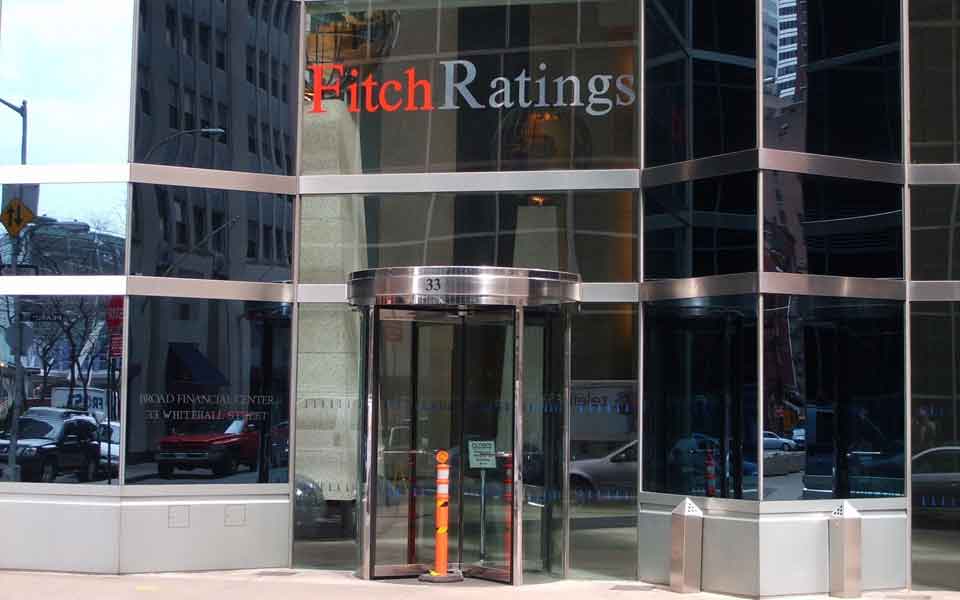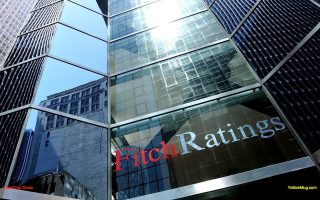Fitch: Budget balance to convince market

The European Central Bank may be one of the strongest allies of Greece in this crisis, but the anticipated conclusion of the PEPP program is not expected to put Greek bonds at risk, as until then the sustainability of the country’s public finances will have improved further, Fitch Ratings analysts told Kathimerini.
“It’s true that we expect government debt to GDP in Greece to have reached above 210% in 2020 – which is around three-and-a-half times our estimate for the BB median, following the severe shock to the economy and the public finances from the Covid-19 pandemic. And we know government debt will be high for a long time. We would be worried if the public debt ratio were not to fall back from this peak – and we highlight this as a factor that could lead to negative rating action,” says Alex Muscatelli, Sovereign Group Director at Fitch.
“At the same time we recognize that there are mitigating factors that support debt sustainability. Some of these factors are domestic: Greece's liquid asset buffer is substantial (around 20% of forecast GDP), and can accommodate unexpected increases in spending; the concessional nature of the vast majority of Greece's public debt and the moderate amortization schedule mean that debt-servicing costs are low. We estimate that over the next two years, overall debt service (amortizations, interest payments and primary deficits) will be broadly in line with our assumption for the cash buffer. Moreover, the average maturity of Greek debt (around 20 years) is amongst the longest across all Fitch-rated sovereigns, reducing the risk from interest rate rises. These are just Greece-specific considerations, then there is the support from the ECB,” he argues.
Muscatelli adds the Greek budget balance is expected to convince investors in the post-PEPP era: “The inclusion of Greek government bonds in the PEPP is an important additional source of financing flexibility. On the basis of Greece's capital key at the ECB, this would allow for up to 37 billion euros of bonds to be bought on the secondary market by the Eurosystem, and ECB data suggest that only around half of that amount has been used. There may be some risks to marginal funding costs when the program ends, but we have to remember that while the net purchases may end early next year, the ECB has indicated that funds from matured bonds will be reinvested until at least the end of 2023. So there is a small risk for now of an abrupt end to ECB purchases. Our projections suggest that by 2022 or 2023 the Greek budget will be close to a primary balance and that would provide further confidence in the sustainability of the public finances.”
He does not rule out a rating or outlook upgrade in the next couple of years: “Greece’s rating is on a Stable Outlook, which means that we think it is likely that the rating will not change over a one-to-two-year horizon. That said, if the government debt ratio returned to a firm downward path after the coronavirus shock dissipates, particularly through improved economic growth dynamics and fiscal consolidation, those may be triggers for a positive change in the outlook or the rating,” Muscatelli tells Kathimerini.
The risks the economy runs is from the low recovery of tourism and from any delays in the absorption of EU funds, he warns.
”Delays to the vaccination roll-outs, not just in Greece but also among its main trading partners, would slow down the rebound in the tourism sector. This is a key risk to the economic recovery in the near term, we saw in 2020 how the much-curtailed tourist season meant that economic activity did not bounce back in the third quarter of the year as it did in other European economies. Our colleagues on the Corporates side believe it will take some time for the tourism sector to recover, and that occupancy levels in Europe for example in 2023 will still be a bit lower than 2019 (around 8%). From our side, we estimate that the current account deficit widened considerably due to low tourism arrivals in 2020, to 7.2% of GDP, and that it will narrow only gradually to 5.7% in 2022. Another, more medium-term risk, is a slow absorption rate of the funds from the EU Recovery Plan.”
Moratoria phase-out
Fitch officials also noted that even though the pandemic is increasing the stock of nonperforming exposures of Greek banks, the NPE index is expected to go down this year, too, thanks to the securitizations, though the challenges for the sector remain considerable.
“The use of moratoria and the regulatory forbearance contained the asset-quality deterioration in 2020 (in fact, the impaired loan ratio for the sector reduced to 36% from 41% in 2020). Also, as you are aware, the expansionary fiscal policy and the implementation of support schemes by the Greek government, including payment subsidies such as ‘Gefyra’ and guarantees for certain loans, have supported and is supporting borrowers' financial position,” explains Pau Labro, the agency’s Director on Financial Institutions.
“We expect increased inflows of impaired loans given the phasing-out of the moratoria. Similar to other countries with little recourse to state guarantees loans, the use of moratoria in Greece is relatively high, representing 12% of total bank loans on average. The moratorium has been partially extended following the second lockdown, but we estimate that the bulk of the moratoria has already expired at end-2020 or will expire in early 2021. We expect the Greek banks will try to mitigate the impact of the loan moratoria expiration by using state support schemes (which are likely to be extended in 2021) and by offering some private restructurings, such as a gradual repayment of the monthly tranches.”
“In our base case scenario, we expect the impaired loan ratio for the sector to decline to about 30% at end-2021 from 36% if banks execute the planned securitizations for 2021, making use of the asset protection scheme, despite the expected new inflows of impaired loans, which would contribute about six percentage points in the impaired loan ratio. For our estimations, we are including the large securitizations planned by NBG, Alpha and Piraeus for 2021 with a gross value of about €25 billion. These transactions are contingent on the materialization of the economic recovery, on investor appetite and on the ultimate impact on the banks' capitalization,” Labro says.
“Of course, we live in a very evolving environment with clear downside risks but we still reckon that the credit profile of Greek banks could improve (again from a weak position) if the moderate recovery materializes and the banks manage to execute the securitizations (with limited impact on capital) and contain the new inflows of impaired loans from the moratoria. Last June, for example, Fitch upgraded the ratings of Eurobank to 'B-' with a Negative Outlook despite the environment as the bank managed to complete a large securitization of impaired loans, reducing its impaired loan ratio to about 15%, which is well below the domestic sector. Extraordinary support measures by authorities, including government support or sector-wide NPL work-out schemes, or the new insolvency framework could also benefit the credit profile of the banks.”
Labro further views positively the central bank’s proposal for a bad bank: “The proposal by the Bank of Greece to establish an asset management company could indeed be positive for banks’ asset-quality prospects and also would improve the banks' capital quality by reducing the high proportion of deferred tax credits. However given the current uncertainty, we do not factor in any impact of this scheme in our projections.”
Fitch also expects corporate bond issues to take off this year, the agency’s EMEA Head of Corporate Ratings Alex Griffiths answered to Kathimerini: “We expect to see more international issuance from Greek corporates in 2021, reflecting strong market conditions and the fact that companies will move from ‘emergency’ short term funding, which has often been provided by banks, to longer dated, more diversified solutions. But there will always be a tradeoff for the largest companies on price, which will be a very important consideration,” he said.





